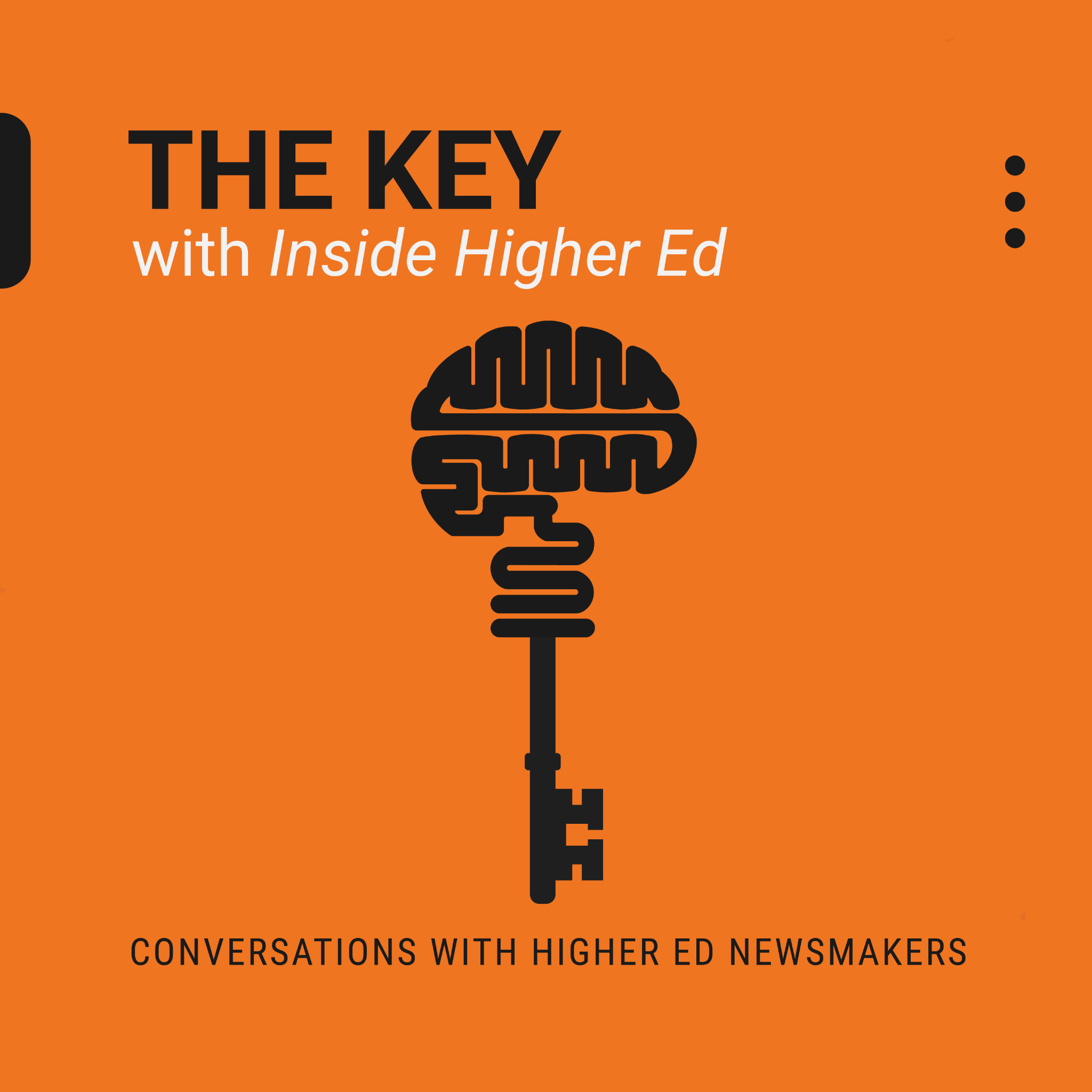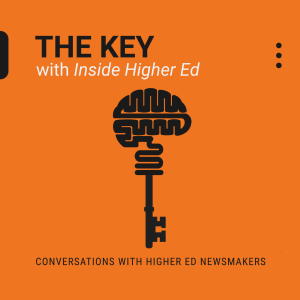
Hear candid conversations with higher-ed newsmakers. Hosted by Inside Higher Ed. Inside Higher Ed is the leading source for the latest news, analysis, and services for the entire US higher education community.
Hear candid conversations with higher-ed newsmakers. Hosted by Inside Higher Ed. Inside Higher Ed is the leading source for the latest news, analysis, and services for the entire US higher education community.
Episodes

Thursday Mar 28, 2024
Ep. 108: Helping Learners Plan Their Path Through College
Thursday Mar 28, 2024
Thursday Mar 28, 2024
The “guided pathways” model as not just a student success initiative, but a way to redesign how a college operates.
This week’s episode of The Key podcast explores the “guided pathways” model, which hundreds of community colleges have embraced to give students a clearer path to reaching their educational goals.
Davis Jenkins, a senior research scholar at the Community College Research Center at Columbia University’s Teachers College, and Hana Lahr, a senior research associate and director of applied learning there, join The Key to discuss their recent papers evaluating how guided pathways has spread, what iterations of the model work best, and what it takes to bring about this kind of sweeping, “whole college” change at institutions that can be both tradition-bound and financially strapped.
The Key is hosted by Inside Higher Ed Co-founder and Editor Doug Lederman. This episode is sponsored by Coursedog.

Wednesday Mar 20, 2024
Ep. 107: Voices Of Student Success: Making College Visible to Rural Learners
Wednesday Mar 20, 2024
Wednesday Mar 20, 2024
In this episode, host Ashley Mowreader spoke with Ron Slinger, president of Miles Community College, to learn more about the college’s Opportunity Realized program and how the initiative is benefiting Montana, the college and students’ futures.
Hosted by Inside Higher Ed Student Success Reporter Ashley Mowreader. This episode is sponsored by InsideTrack.

Friday Mar 15, 2024
Ep. 106: Higher Ed News Roundup: Athlete Unions and the FAFSA Fiasco
Friday Mar 15, 2024
Friday Mar 15, 2024
A panel of news hounds discusses some of the biggest stories involving colleges.
This week’s episode features a conversation about some of the hottest news developments unfolding in higher education today.
Topics include how the recent formation of a union for basketball players at Dartmouth College might help to reshape college sports, the turmoil created by the federal government’s botched roll-out of the federal financial aid form, and what Inside Higher Ed’s recent survey of college and university presidents says about higher education and about campus leaders themselves.
Joining the discussion is Katherine Knott, who covers federal policy for Inside Higher Ed, and Erin Hennessy, executive vice president at TVP Communications and an acute observer of higher education.
The Key is hosted by Inside Higher Ed Co-founder and Editor Doug Lederman. This episode is sponsored by Coursedog.

Wednesday Mar 06, 2024
Ep. 105: Voices of Student Success: Improving Textbook Affordability
Wednesday Mar 06, 2024
Wednesday Mar 06, 2024
Affordability is a top concern for higher education leaders, and professors are directly responsible for the affordability of their course materials. In this episode, Patty Goedl from the University of Cincinnati at Clermont discusses her OER e-textbook, which she wrote and developed to make her managerial accounting course more accessible to learners.
Hosted by Inside Higher Ed Student Success Reporter Ashley Mowreader. This episode is sponsored by InsideTrack.

Tuesday Feb 27, 2024
Ep. 104: Higher Education in a ‘Post-Generational Society’
Tuesday Feb 27, 2024
Tuesday Feb 27, 2024
What would postsecondary education look like in a world where true lifelong learning – people engaging in education or training at many points throughout their lives – was the norm?
This week’s episode of The Key features a conversation with Mauro F. Guillén, the William H. Wurster Professor of Multinational Management at the Wharton School at the University of Pennsylvania and author of The Perennials: The Megatrends Creating a Post-Generational Society.
The book isn’t about higher education; it explores cross-cutting trends -- people living longer and healthier lives, and technological changes that shorten the half-life of our knowledge and skills – that promise to blur the “stages” (play, schooling, work and retirement) into which most of us have historically divided our lives.
In the conversation, Guillén discusses the implications of these shifts for institutions and learners, and what it would take for colleges and universities to truly operate as providers of lifelong learning for people in a society where one’s chronological age becomes less meaningful and work and learning blend throughout our lives.
The Key is hosted by Inside Higher Ed Co-founder and Editor Doug Lederman. This episode is sponsored by Coursedog

Wednesday Feb 21, 2024
Ep 103: Voices Of Student Success: Adult Learners in Higher Education
Wednesday Feb 21, 2024
Wednesday Feb 21, 2024
The episode features two higher education professionals, Mike Krause from the John M. Belk Endowment and Ashley Flood from Purdue Global, on adult learners. Krause and Flood talk about the needs of adult learners, how an institution can support their success and practical ways to assist students.
Hosted by Inside Higher Ed Student Success Reporter Ashley Mowreader. This episode is sponsored by InsideTrack.

Wednesday Feb 07, 2024
Ep 102: Voices of Student Success: Engaging Faculty in Student Success
Wednesday Feb 07, 2024
Wednesday Feb 07, 2024
This week’s episode of Voices of Student Success features Jody Greene, associate campus provost for academic success at the University of California, Santa Cruz, on the relationship between faculty and student success, how UCSC is empowering faculty to practice equitable course design and the future of academic success.
Hosted by Inside Higher Ed Student Success Reporter Ashley Mowreader. This episode is sponsored by InsideTrack.

Wednesday Jan 24, 2024
Wednesday Jan 24, 2024
This week’s episode of Voices of Student Success features Adelí Durón, the inaugural director of the Latinx Resource Center at the University of California, Irvine, on its mission and how she works to ensure student voices inform programming, engagement and center leadership.
Hosted by Inside Higher Ed Student Success Reporter Ashley Mowreader. This episode is sponsored by InsideTrack.

Wednesday Oct 11, 2023
Ep. 100: The Key Podcast Hits 100 (Episodes)
Wednesday Oct 11, 2023
Wednesday Oct 11, 2023
Three years ago, Inside Higher Ed created a podcast to try to give its audience insight into how the COVID-19 pandemic was affecting colleges, employees and students, with a particular focus on the more “invisible” students who too often fly under the radar of journalists and campus leaders.
This week’s episode, The Key’s 100th, features a discussion with Paul Fain, who as Inside Higher Ed’s news editor launched the podcast and nurtured it through its first year. Paul, whose newsletter The Job explores the intersection of employment and education, talks with The Key’s host, Doug Lederman, about the people working on behalf of those invisible students and the issues they’re addressing.
The Key is hosted by Inside Higher Ed Co-founder and Editor Doug Lederman. This episode is sponsored by the Bill & Melinda Gates Foundation.

Tuesday Sep 26, 2023
Ep. 99: Designing Courseware to Produce Equitable Outcomes
Tuesday Sep 26, 2023
Tuesday Sep 26, 2023
“Gateway courses” are supposed to clear the path to fields of study, but for millions of students who struggle in those key classes, they often shut the door prematurely.
This week's episode of The Key digs into early efforts to develop courseware for 20 high enrollment courses that can make or break whether students from all backgrounds persist and ultimately complete their educations. The goal of the initiative, funded by the Bill & Melinda Gates Foundation, is to bring together colleges, companies and research organizations to build digital courses that can be used on dozens if not hundreds of campuses to eliminate gaps in performance by students from different backgrounds.
Ariel Anbar is a President’s Professor at Arizona State University, which is working with Carnegie Mellon University and the publisher OpenStax to create a general chemistry course heavy on active learning and real-world problem solving. Jeanette Koskinas is chief product officer at Lumen Learning, which is developing an intro statistics course in close collaboration with students and instructors at institutions like Rockland Community College and Santa Ana College.
The Key is hosted by Inside Higher Ed Co-founder and Editor Doug Lederman. This episode is sponsored by the Bill & Melinda Gates Foundation.
